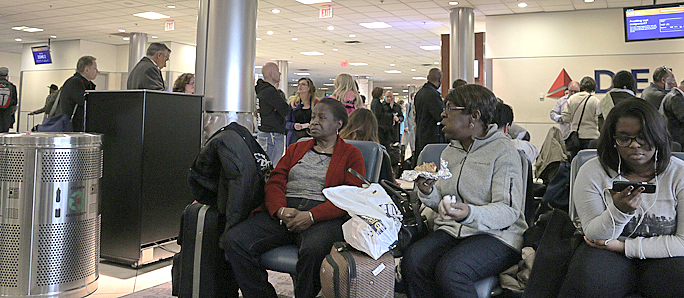If you are fortunate enough to have a friend or relative who is an employee of an airline, chances are that you could have access to a buddy pass to travel the world, as each eligible employee of an airline is able to provide a limited number of buddy passes to family members and friends — but there are some disadvantages to using one despite the low cost, according to the 11 reasons why you may not want to use a buddy pass when traveling listed in this article.
Buddy Pass Travel Now More Restrictive on Delta Air Lines
One of the least-expensive ways to travel around the world by airplane is on a buddy pass, which is basically an airline ticket whose nominal cost is typically little more than the taxes and fees for a comparable revenue fare; and it can only be used for personal travel, leisure travel, or emergency travel.
Buddy passes are meant to be used by the relatives or friends — or buddies — of the airline employee who has an limited allotment of them as part of their perks and benefits of employment by the airline. Specifically to Delta Air Lines, this includes the employee, spouse, dependent children, and parents — as defined by the Internal Revenue Service of the United States — but Delta Air Lines also includes nondependent children, travel companions, domestic partners and their children, and buddy pass riders.
Effective as of Monday, January 1, 2018, buddy passes for use on Delta Air Lines have become more restrictive.
Payment Process Via Payroll Deduction
The minimal cost of a buddy pass can now only be paid by an employee of Delta Air Lines via a payroll deduction. This is required for the purchase of both buddy pass and non-dependent travel to significantly increase the difficulty for the very few people who currently abuse the buddy pass program for their own gain.
Prior to 2018, the fee for a buddy pass could be charged to the credit card of the rider who is using it.
Eligibility to Be Cleared Into a Premium Class Cabin
If you are traveling by yourself using a buddy pass and you are not an eligible employee of Delta Air Lines, you are out of luck in securing a seat in a premium class cabin. An eligible employee of Delta Air Lines — or one of the eligible pass riders listed in the Pass Record of the eligible employee — must accompany the passenger with the buddy pass in order for that passenger with the buddy pass to be cleared into the premium cabin, which includes the first class cabin or the Delta One cabin.
This change is to help protect the continuing substantial investment of Delta Air Lines in its Delta One product.
Prior to this year, the passenger with the buddy pass could be cleared into the premium cabin based on the seniority of the employee of Delta Air Lines who issued the buddy pass — but could be eligible for the premium cabin when flying by himself or herself; or without the employee.
Registration and Personal Identification
In an effort to improve the ability to identify and track people who use the buddy pass program and are not employees of Delta Air Lines, employees of Delta Air Lines are now required to pre-register buddy pass riders and “pass eligible dependents” with some form of personally identifiable information — such as a Social Security number or comparable government issued identification as two examples. This change is expected to provide a critical extra level of protection for the business of Delta Air Lines.
Summary
When these changes to the buddy pass program were first announced last year, Delta One was supposedly to be the only premium cabin which required accompaniment by an eligible employee; but the first class cabin has the same requirement. Delta Air Lines had already eliminated several fees which became effective as of Thursday, May 25, 2017.
The aforementioned changes are meant to reduce any abuse of the buddy pass program by tightening the restrictions while saving Delta Air Lines money, as a cost is associated using a Delta Air Lines buddy pass; but that cost is usually less expensive than the published fare for a specific city pair.
Delta Air Lines is attempting to ensure that its pass travel program “remains highly competitive across the industry and provides great convenience and flexibility” for its employees while simultaneously implementing proper safeguards to ensure lower susceptibility to the risks — wherever necessary — which can accompany such a program.
Delta Air Lines relaxed the dress code several years ago for passengers — including those who travel using buddy passes — but according to this document offered by Delta Air Lines back in 2011 which details the proper business etiquette when traveling while using a buddy pass:
Delta has a relaxed dress code for pass riders, including Buddies. The standard is based on respect — for our customers and for you. Delta trusts your good judgment when traveling on a Buddy Pass. Just remember, Delta has a relaxed dress code for pass riders, but that doesn’t mean a sloppy appearance is acceptable. You should never wear unclean, revealing or lewd garments, or swimwear or sleepwear on a flight. The relaxed dress code also applies for Buddy Pass travel on Delta Connection carriers.
Non-revenue pass travel is considered a privilege; but it is not without its problems and issues. For additional information about buddy pass travel, please refer to the following articles:
- 11 Reasons Why You May Not Want to Use a Buddy Pass When Traveling
- Warning: Why You Should Never Purchase Buddy Passes
- 10 Tips on How to Use Buddy Passes to Prevent Your Trip From Going Horribly Wrong
- Two Girls Not Permitted Aboard Airplane Due to What They Wore — and Why
Photograph ©2015 by Brian Cohen.
